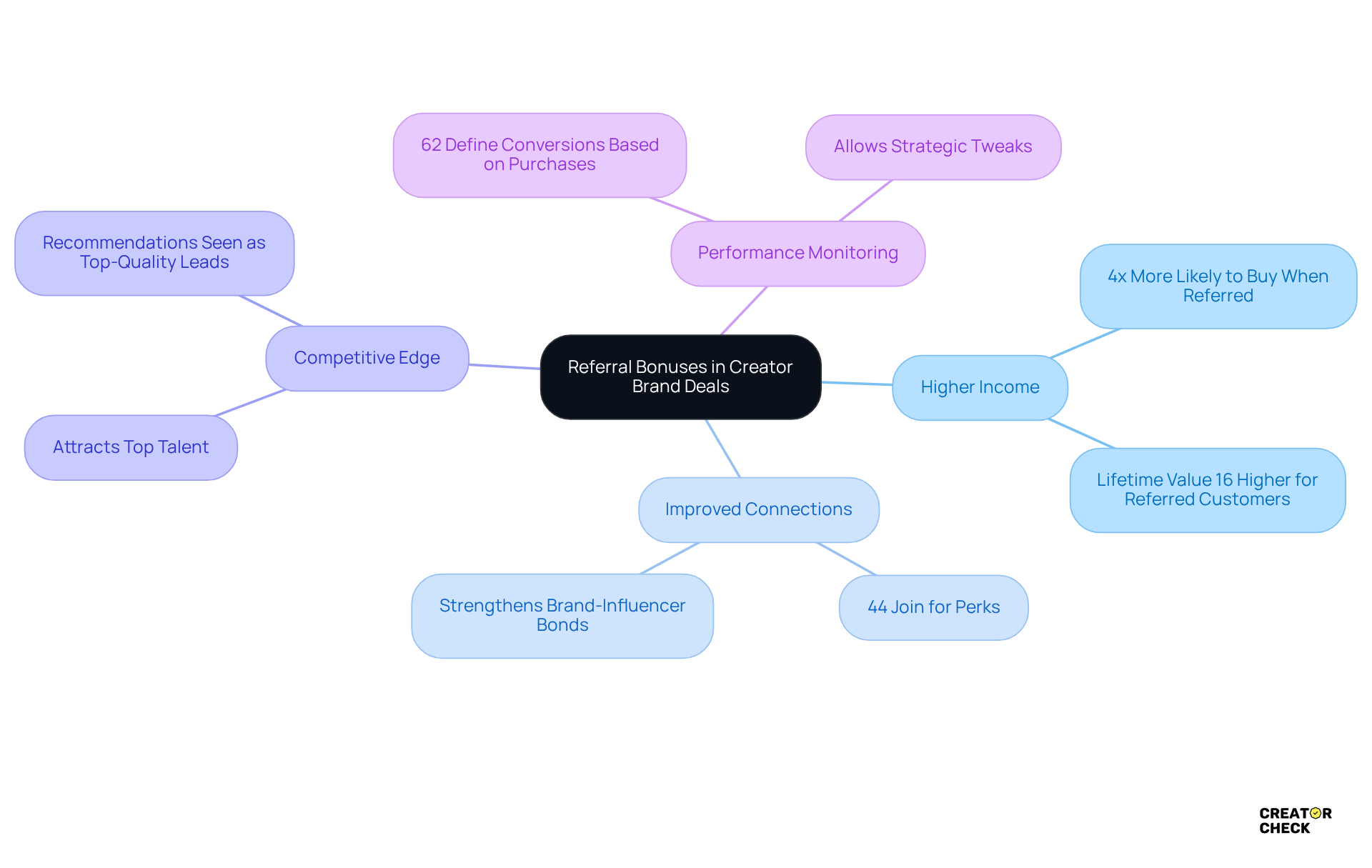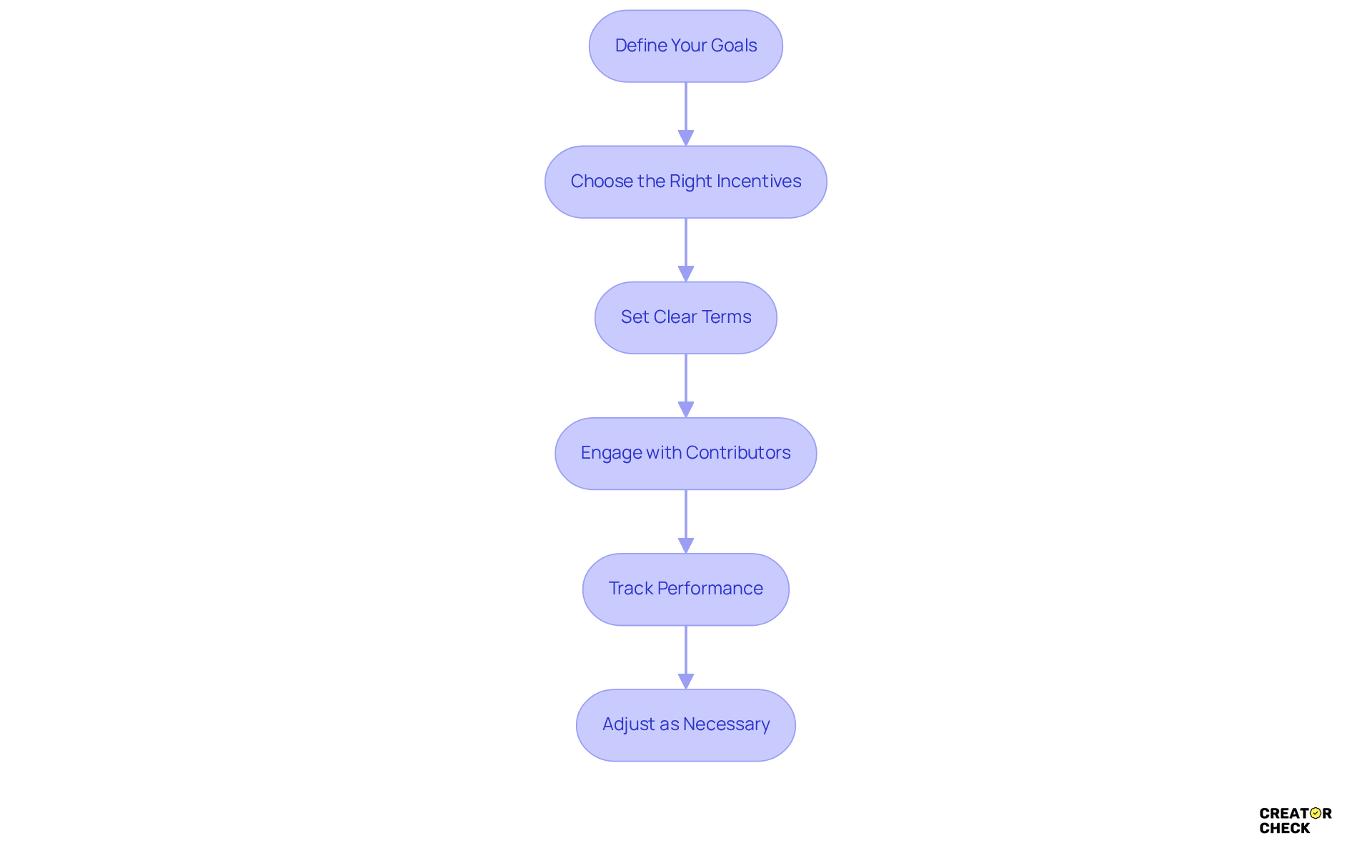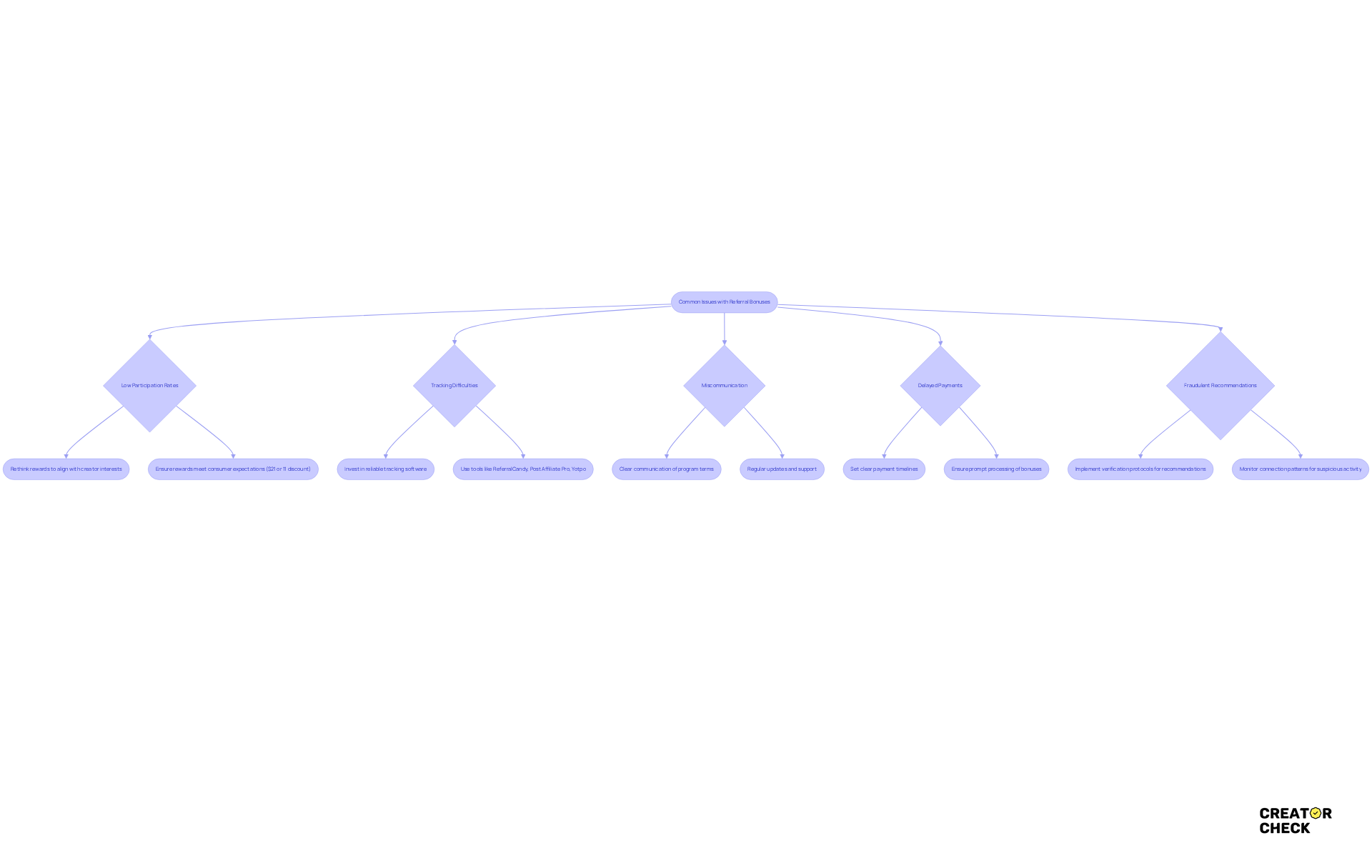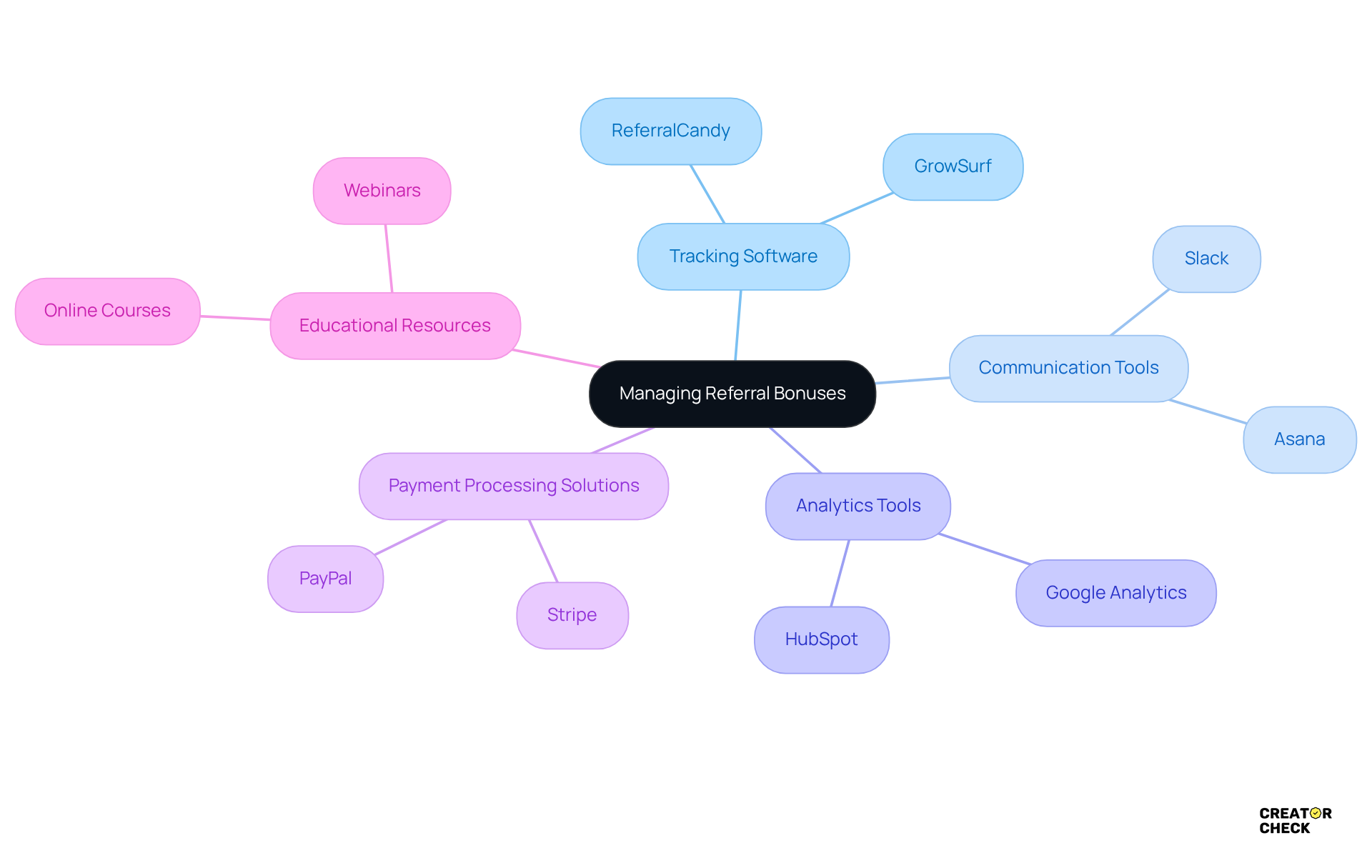Overview
This article dives into the world of referral bonuses in creator brand deals, showcasing their perks and offering a simple, step-by-step guide for agencies.
So, why should you care? Referral bonuses can boost your income, tighten the bonds between brands and creators, and elevate the overall performance of your campaigns.
Plus, there are stats that back this up—effective referral programs have been shown to ramp up consumer engagement and loyalty. Sounds good, right? Let’s explore how you can make this work for you!
Introduction
Adding referral bonuses to creator brand deals can really shake things up in influencer marketing. It turns those casual endorsements into powerful partnerships that generate real revenue. These incentives not only give creators a little extra motivation to promote brands more enthusiastically, but they also strengthen the bond between influencers and companies, paving the way for loyalty and long-term collaborations.
So, how can agencies roll out these referral bonuses effectively to boost engagement and tackle common challenges? Let’s dive into this guide, where we’ll explore the step-by-step process of integrating referral bonuses and look at the benefits and potential hurdles you might encounter along the way.
Understand Referral Bonuses and Their Impact on Creator Brand Deals
Referral rewards are fantastic motivators for folks who successfully bring new clients or customers to a brand. These incentives can take many forms, like cash rewards, discounts, or exclusive products. Understanding how adding referral bonuses to creator brand deals works is essential for agencies aiming to enhance their contributors' earnings.
- Higher Income: Referral incentives can really inspire individuals to promote brands more enthusiastically, which can lead to increased sales and income. Did you know that consumers are four times more likely to buy when referred by a friend? Plus, the lifetime value of a referred customer is, on average, 16% higher than that of non-referred customers. That really highlights the power of word-of-mouth marketing!
- Improved Connections: Offering incentive rewards can strengthen the bond between brands and influencers, fostering loyalty and supporting long-lasting collaborations. In fact, 44 percent of consumers join recommendation programs mainly for the perks or rewards. This shows just how important these incentives are in building connections and loyalty.
- Competitive Edge: In a bustling market, providing incentives for recommendations can set a brand apart, making it more appealing to creators. Marketers see recommendations as the top-quality source of leads, which can attract top talent looking for win-win partnerships.
- Performance Monitoring: Referral rewards can be tied to specific performance metrics, allowing agencies to assess how well their campaigns are doing. Notably, 62% of recommendation programs define conversions based on a purchase event, enabling strategic tweaks to ensure that both brands and contributors get the most out of their financial benefits.
By effectively using incentive rewards and adding referral bonuses to creator brand deals, agencies can create a win-win situation that benefits both the brand and the creator, ultimately driving growth and success in their partnerships. So, what does this mean for you? It’s all about leveraging these rewards to foster those valuable connections!

Implement Referral Bonuses: Step-by-Step Process
Implementing referral bonuses can be a game-changer, and it involves a few key steps that are pretty straightforward:
-
Define Your Goals: So, what do you want to achieve with your referral program? Maybe it’s boosting sales, increasing customer retention, or expanding your audience base. A clear, measurable objective—like gaining 100 new customers by the end of Q2—can really guide your strategy.
-
Choose the Right Incentives: Next up, think about the incentives that will resonate with your creators. Cash rewards, exclusive discounts, or unique products could be great options. Did you know that 39% of people say monetary or material incentives significantly boost their likelihood of referring a brand? This step is crucial!
-
Set Clear Terms: It’s important to establish straightforward conditions for earning those bonuses. How many recommendations do you need? What are the specific sales thresholds? Being clear about the terms helps avoid misunderstandings and encourages more people to participate.
-
Engage with Contributors: Now, let’s talk about communication. Make sure your contributors understand how the recommendation program works and the benefits they can gain. After all, 71% of consumers are more likely to make a purchase based on social media recommendations.
-
Track Performance: You’ll want to keep an eye on how things are going. Use tracking tools to monitor the recommendations and sales generated by each creator. This data is invaluable for tweaking your marketing strategies and understanding consumer behavior, which is key to assessing how effective your initiative is and spotting areas for improvement.
-
Adjust as Necessary: Finally, be ready to make adjustments based on what the data tells you. Whether it’s changing up the incentives or revising the terms, being adaptable is essential for maximizing engagement and revenue.
By following these steps, agencies can effectively roll out incentive rewards, such as adding referral bonuses to creator brand deals, that not only drive engagement but also significantly boost revenue generation. Just look at Latico Leathers—they automated their recommendation system and raked in over $18,000 from suggestions, boasting a 17.3x ROI! That’s some serious potential for success with these initiatives.

Troubleshoot Common Issues with Referral Bonuses in Brand Deals
Implementing referral bonuses can really boost brand deals, but agencies often run into a few common hurdles:
-
Low Participation Rates: If folks aren’t getting involved with the incentive program, it might be time to rethink the rewards on offer. Did you know that 44% of consumers join recommendation schemes mainly to snag incentives or rewards? So, it’s crucial to ensure that these rewards are appealing and relevant to the creators' interests and needs. Plus, shoppers expect at least $21 or an 11% discount in referral programs, which can serve as a solid benchmark for your incentive structures.
-
Tracking Difficulties: To keep tabs on those recommendations, consider investing in reliable tracking software that meshes well with your current systems. Some popular options in influencer marketing include ReferralCandy, Post Affiliate Pro, and Yotpo. This tech can streamline the process and provide accurate insights on recommendation activities.
-
Miscommunication: Clear communication is key! Make sure that all creators fully understand the terms of the referral program. Regular updates and support can help clear up any confusion and keep everyone in the loop. It’s worth noting that 56% of consumers shy away from referral programs because they fear annoying their friends or simply aren’t aware of them, which underscores the importance of effective communication strategies.
-
Delayed Payments: Prompt payment of bonuses is essential for building trust. Set clear timelines for when creators can expect their rewards, ensuring that payments are processed without delay.
-
Fraudulent Recommendations: To guard against misuse, put protocols in place to verify recommendations. This might involve checking new customer accounts or closely monitoring connection patterns to spot any suspicious activity. As expert Jagmeet Singh points out, code fraud can undermine the integrity of your system, so staying vigilant is a must.
By proactively addressing these challenges, agencies can significantly enhance the effectiveness of their incentive programs by adding referral bonuses to creator brand deals, ultimately driving higher engagement and revenue.

Utilize Tools and Resources for Managing Referral Bonuses
To effectively manage referral bonuses, agencies can tap into a variety of tools and resources that help streamline processes and boost communication.
So, what does this mean for you? Here are a few key tools to consider:
-
Tracking Software: Think about using platforms like ReferralCandy or GrowSurf. They let you keep an eye on recommendations, manage payouts, and analyze performance metrics. Plus, these tools offer insights that can help you enhance your promotion strategies. Did you know that 62% of consumers would be more likely to participate if there’s a leaderboard involved?
-
Communication Tools: Keeping the lines of communication open with contributors is crucial. Platforms like Slack or Asana can help you keep everyone in the loop about the partnership. When creators are informed about updates and expectations, it fosters engagement and clarity.
-
Analytics Tools: Want to know how effective your initiative is? Check out analytics platforms like Google Analytics or HubSpot. They allow you to assess key performance indicators and make data-driven decisions. After all, 84% of people trust recommendations from people they know.
-
Payment Processing Solutions: Timely and automated payments for bonus incentives are a must. Services like PayPal or Stripe can streamline the financial side of your recommendation systems, making everything run more smoothly.
-
Educational Resources: Investing in online courses or webinars centered on marketing strategies can keep you updated on best practices and innovative approaches. Ongoing education is key to enhancing the efficiency of your recommendation initiatives. Wafiqa Abbas even points out the importance of dual-sided recommendation programs.
By integrating these tools and resources, including the capabilities of Creator Check, agencies can simplify the process of adding referral bonuses to creator brand deals. This not only enhances efficiency but ultimately drives higher engagement and revenue. So, let’s get started on making those referral bonuses work for you!

Conclusion
Adding referral bonuses to creator brand deals can really amp up your marketing strategies, creating a win-win situation for both brands and influencers. By tapping into these incentives, agencies can motivate creators to promote products with more enthusiasm, while also building loyalty and strengthening partnerships that lead to long-term success.
So, why are referral bonuses so important? They can boost income, enhance connections, and give you that competitive edge in the market. It’s crucial to set clear goals, offer appealing incentives, and communicate effectively to ensure everything runs smoothly. Plus, by tackling common challenges—like low participation rates and tracking issues—you can streamline the process and maximize both engagement and revenue.
Ultimately, integrating referral bonuses into creator brand deals isn’t just about short-term gains; it’s about forging lasting partnerships built on trust and shared success. With the right tools and resources, agencies can turn their referral programs into powerful marketing assets, encouraging creators to connect with their audiences and drive brand loyalty. Embracing this approach can lead to a more vibrant and effective influencer marketing landscape, where both brands and creators thrive together. So, what are you waiting for? Let’s make those connections count!
Frequently Asked Questions
What are referral bonuses?
Referral bonuses are incentives offered to individuals who successfully bring new clients or customers to a brand. These can take various forms, such as cash rewards, discounts, or exclusive products.
How do referral bonuses impact income for creators?
Referral incentives can motivate individuals to promote brands more vigorously, leading to increased sales and higher income. Consumers are four times more likely to buy when referred by a friend, and referred customers have a lifetime value that is, on average, 16% higher than non-referred customers.
How do referral bonuses strengthen connections between brands and influencers?
Offering referral rewards can enhance the relationship between brands and influencers, fostering loyalty and supporting long-lasting collaborations. Approximately 44% of consumers join recommendation programs primarily for the perks or rewards.
What competitive advantages do referral bonuses provide brands?
In a competitive market, providing incentives for referrals can differentiate a brand and make it more appealing to creators. Marketers regard recommendations as a top-quality source of leads, attracting top talent looking for mutually beneficial partnerships.
How can agencies monitor performance related to referral bonuses?
Referral rewards can be linked to specific performance metrics, allowing agencies to evaluate the effectiveness of their campaigns. Notably, 62% of recommendation programs define conversions based on a purchase event, enabling strategic adjustments to maximize financial benefits for both brands and contributors.
What is the overall benefit of using referral bonuses in creator brand deals?
Effectively utilizing referral bonuses can create a win-win situation for both the brand and the creator, driving growth and success in their partnerships by fostering valuable connections.




